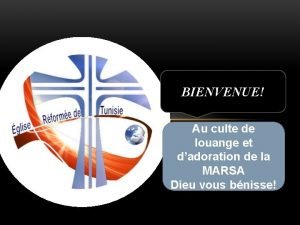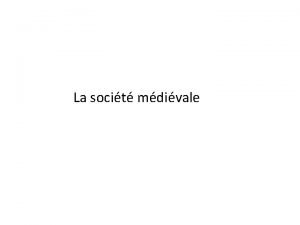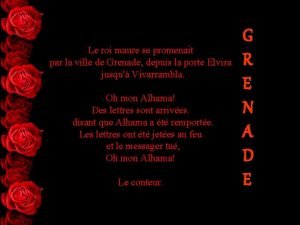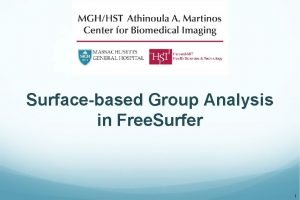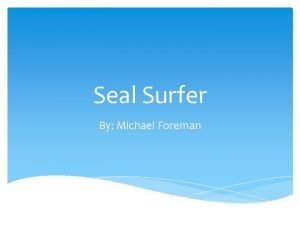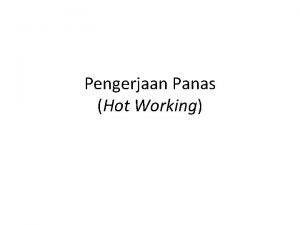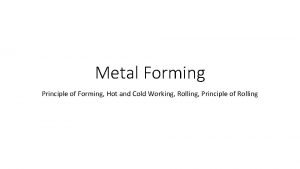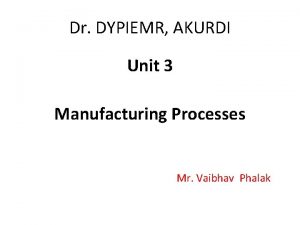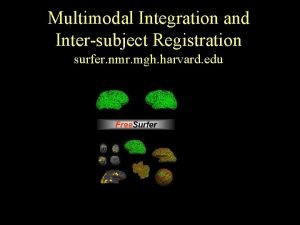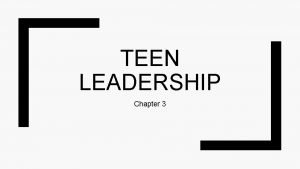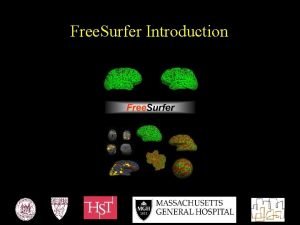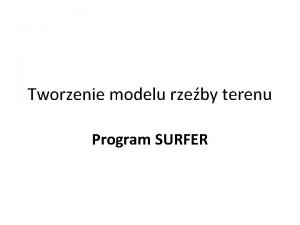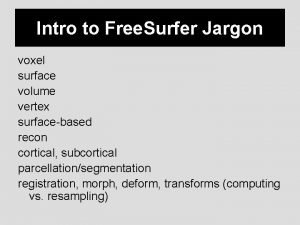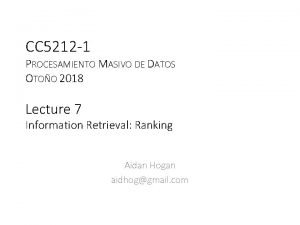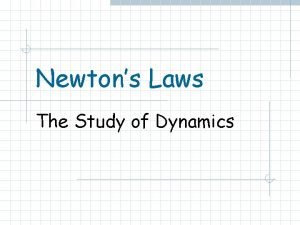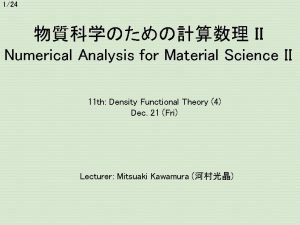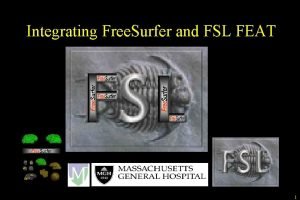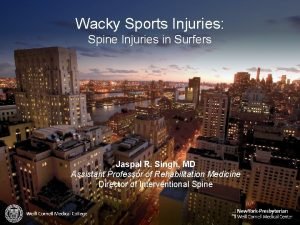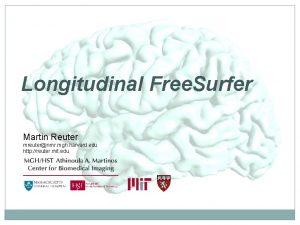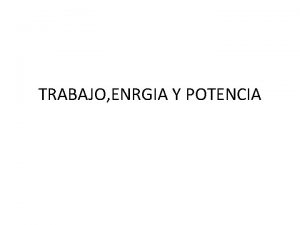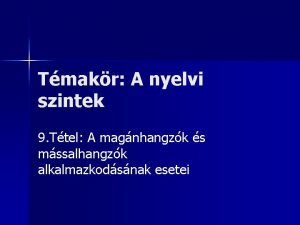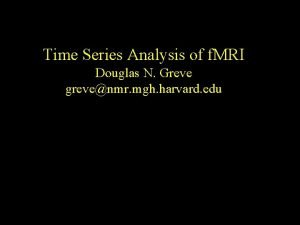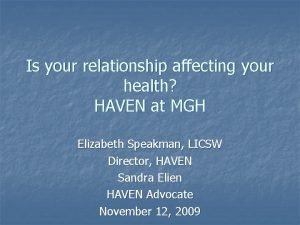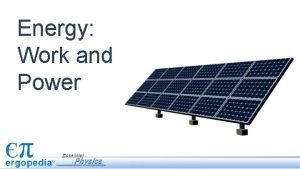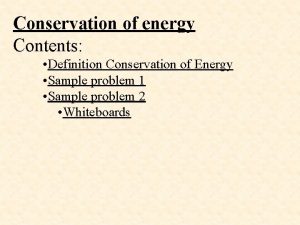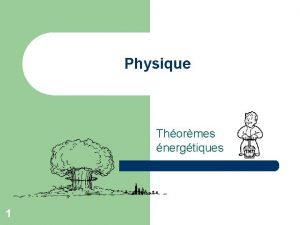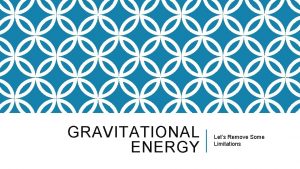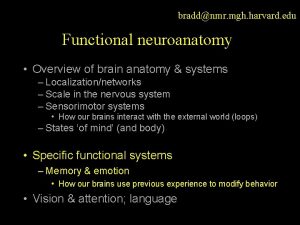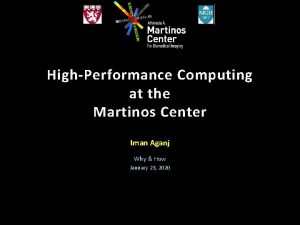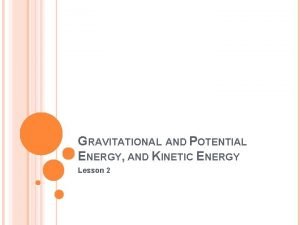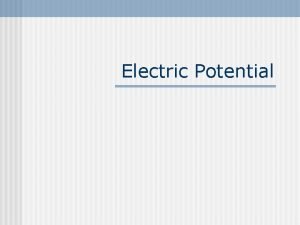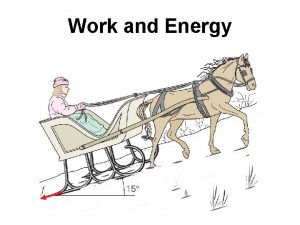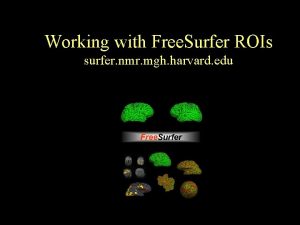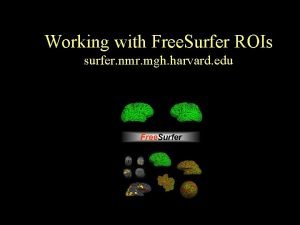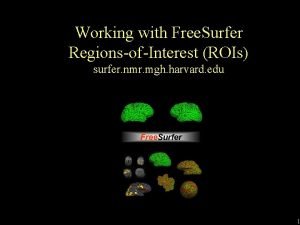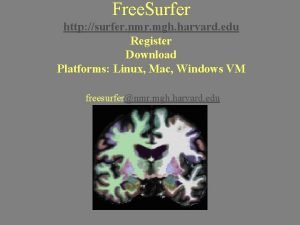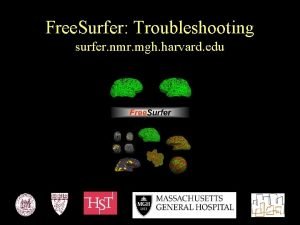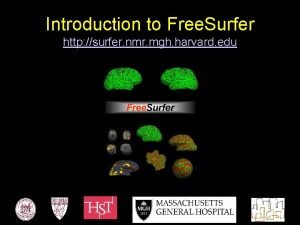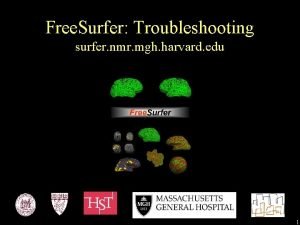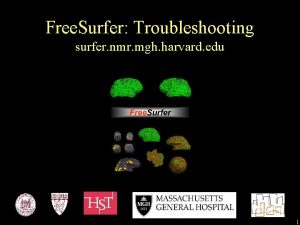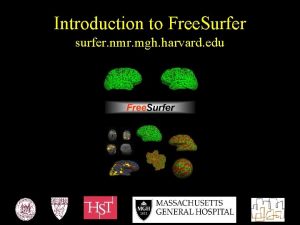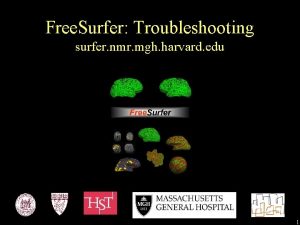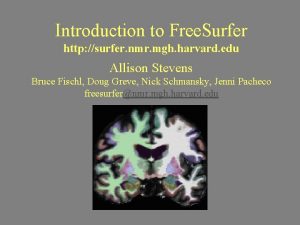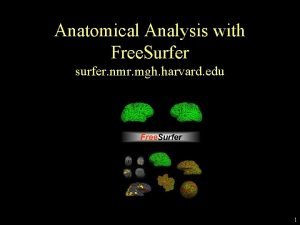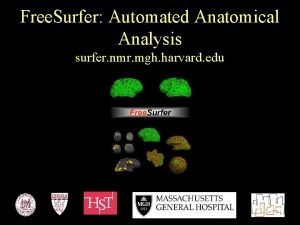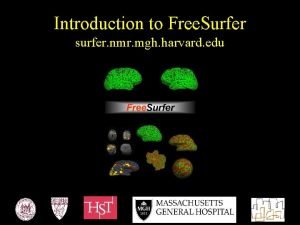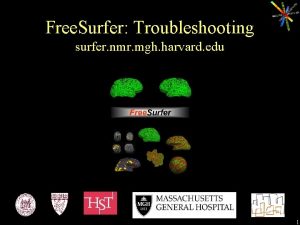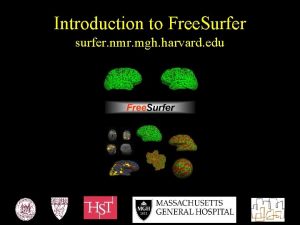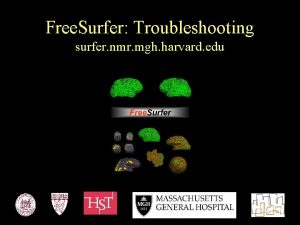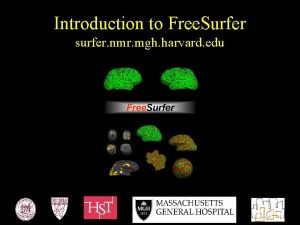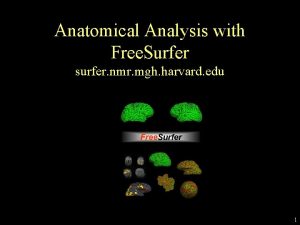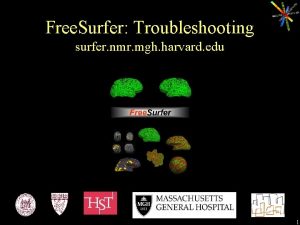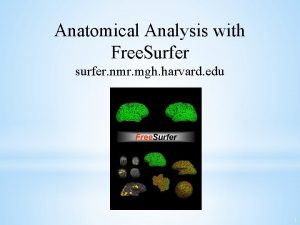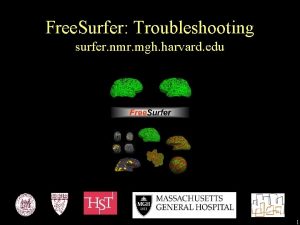Working with Free Surfer ROIs surfer nmr mgh







































- Slides: 39

Working with Free. Surfer ROIs surfer. nmr. mgh. harvard. edu

Outline • Free. Surfer ROI Terminology • ROI Statistics Files • ROI Studies – Volumetric/Area – “Intensity” • Free. Surfer ROI Atlases • Atlas Creation and Application

Free. Surfer ROI Terminology • ROI = Region Of Interest which can include: – Segmentation (i. e. subcortical) – Parcellation/Annotation – Clusters, Masks (from sig. mgh, f. MRI) – Label you created

Segmentation • • Volume or surface (usually volume) Volume-style format (eg, mgz, nii, etc) Each voxel/vertex has one index (number ID) Index List found in color lookup table (LUT) – $FREESUFER_HOME/Free. Surfer. Color. LUT. txt 17 Left-Hippocampus 220 216 20 0 Index = 17 Name = Left-Hippocampus Red=220, Green=216, Blue=20 (out of 255) Statistic = 0 (not really used) • aseg. mgz, aparc+aseg. mgz, aparc. a 2005+aseg. mgz, wmparc. mgz

Parcellation/Annotation • • Surface ONLY Annotation format (something. annot) Each vertex has only one label/index Index List also found in color lookup table (LUT) – $FREESUFER_HOME/Free. Surfer. Color. LUT. txt • ? h. aparc. annot, ? h. aparc. a 2005. annot

Clusters • Clusters (significance map; functional activation) – – One output of mri_volcluster and mri_surfcluster are segmentations or annotation (volume vs. surface) Each cluster gets its own number/index Masks (another type of segmentation) • Binary: 0, 1 • Can be derived by thresholding statistical maps Thresholded Activity Activation Clusters

Label File In Volume On Surface – Easy to draw – Use ‘Select Voxels’ Tool in tkmedit – Simple text format

Creating Label Files • Drawing tools: – tkmedit – tksurfer – QDEC • Deriving from other data – – – mris_annotation 2 label: cortical parcellation broken into units mri_volcluster: a volume made into a cluster mri_surfcluster: a surface made into a cluster mri_cor 2 label: a volume/segmentation made into a label mri_label 2 label: label from one space mapped to another

Label File • Surface or Volume • Simple Text format (usually something. label) – Each row as 5 Columns: Vertex X Y Z Statistic • Vertex – 0 -based vertex number – only applies to surfaces, ignored for volumes • XYZ – coordinates (in one of many systems) • Statistic – often ignored • Eg, lh. cortex. label Indicates 4 “points” in label #label , from 4 88 -42. 261 445 -28. 781 446 -39. 862 616 -42. 856 subject fsaverage -81. 724 -85. 827 -74. 518 -74. 239 -13. 242 -16. 289 -14. 432 -5. 499 0. 000000

ROI Statistic Files • • Simple text files Volume and Surface ROIs (different formats) Automatically generated: aseg. stats, lh. aparc. stats, etc Combine multiple subjects into one table with asegstats 2 table or aparcstats 2 table (then import into excel). • You can generate your own with either – mri_segstats (volume) – mris_anatomical_stats (surface)

Segmentation Stats File Index Seg. Id NVoxels Volume_mm 3 Struct. Name 1 2 255076. 0 Left-Cerebral-White-Matter 2 3 266265. 0 Left-Cerebral-Cortex 3 4 5855. 0 Left-Lateral-Ventricle 4 5 245. 0 Left-Inf-Lat-Vent 5 7 16357. 0 Left-Cerebellum-White-Matter 6 8 60367. 0 Left-Cerebellum-Cortex 7 10 7460. 0 Left-Thalamus-Proper 8 11 3133. 0 Left-Caudate 9 12 5521. 0 Left-Putamen 10 13 1816. 0 Left-Pallidum 11 14 852. 0 3 rd-Ventricle 12 15 1820. 0 4 th-Ventricle 13 16 25647. 0 Brain-Stem 14 17 4467. 0 Left-Hippocampus 15 18 1668. 0 Left-Amygdala 16 24 1595. 0 CSF Mean 101. 5872 75. 3682 37. 7920 56. 4091 91. 2850 76. 3620 91. 3778 78. 5801 86. 9680 97. 7162 41. 9007 39. 7053 85. 2103 77. 6346 74. 5104 52. 1348 Std. Dev 7. 9167 9. 4016 10. 9705 9. 5906 4. 8989 9. 5724 7. 4668 8. 2886 5. 5752 3. 4302 11. 8230 10. 6407 8. 2819 7. 5845 5. 8320 11. 6113 Min 34. 0000 28. 0000 20. 0000 26. 0000 49. 0000 26. 0000 43. 0000 42. 0000 66. 0000 79. 0000 22. 0000 20. 0000 38. 0000 45. 0000 50. 0000 29. 0000 Index: nth Segmentation in stats file Seg. Id: index into lookup table NVoxels: number of Voxels/Vertices in segmentation Struct. Name: Name of structure from LUT Mean/Std. Dev/Min/Max/Range: intensity across ROI Eg: aseg. stats, wmparc. stats (in subject/stats) created by mri_segstats Max 148. 0000 152. 0000 88. 0000 79. 0000 106. 0000 135. 0000 108. 0000 107. 0000 106. 0000 69. 0000 76. 0000 107. 0000 94. 0000 87. 0000 Range 114. 0000 124. 0000 68. 0000 53. 0000 57. 0000 109. 0000 65. 0000 40. 0000 27. 0000 47. 0000 56. 0000 68. 0000 62. 0000 44. 0000 58. 0000

Brain, Gray, and White Matter, Intracranial Volumes • Brain – gray matter + white matter + ventricles + hypointensities + hyperintensities • Total Gray – cortical + subcortical gray • Cortical Gray – volume between white and pial excluding non-cortical regions. • Intracranial volume (ICV), estimated Total Intracranial Volume (e. TIV) https: //surfer. nmr. mgh. harvard. edu/fswiki/e. TIV

Getting Stats into Table Format asegstats 2 table --subjects 001 002 003 004 005 006 007 --meas vol --t asegstats. txt cd $SUBJECTS_DIR to find asegstats. txt From Excel, File > Open, search for asegstats. txt (make sure viewing all file types) > Choose Delimited, Space, and Finish

Parcellation Stats File Struct. Name unknown bankssts caudalanteriorcingulate caudalmiddlefrontal corpuscallosum cuneus entorhinal fusiform Num. Vert Surf. Area Gray. Vol Thick. Avg Thick. Std Mean. Curv Gaus. Curv Fold. Ind Curv. Ind 10863 7151 13207 1. 776 1. 629 0. 121 0. 107 383 50. 8 1222 830 2290 2. 711 0. 559 0. 112 0. 027 10 1. 3 830 585 1459 2. 474 0. 569 0. 128 0. 020 10 0. 7 2509 1658 4979 2. 653 0. 567 0. 125 0. 035 27 3. 5 2124 1340 569 0. 489 0. 631 0. 151 0. 110 87 8. 0 2737 1706 3086 1. 741 0. 509 0. 162 0. 065 52 8. 0 495 330 1685 3. 150 0. 753 0. 149 0. 187 15 1. 5 3878 2638 7887 2. 627 0. 724 0. 137 0. 046 57 6. 7 Struct. Name: Name of structure/ROI Num. Vert: number of vertices in ROI Surf. Area: Surface area in mm 2 Gray. Vol: volume of gray matter (surface-based) Thick. Avg/Thick. Std – average and stddev of thickness in ROI Mean. Curv – mean curvature Gaus. Curv – mean gaussian curvature Fold. Ind – folding index Curv. Ind – curvature index Eg, lh. aparc. stats, lh. a 2005 s. aparc. stats created by mris_anatomical_stats

Getting Stats into Table Format aparcstats 2 table --subjects 001 002 003 004 005 006 007 --h rh --meas volume --t aparc_rh_vol_stats. txt aparcstats 2 table --subjects 001 002 003 004 005 006 007 --h rh --meas thickness --t aparc_rh_thick_stats. txt aparcstats 2 table --subjects 001 002 003 004 005 006 007 --h rh --meas area --t aparc_rh_area_stats. txt *Repeat above for lh; . txt files in SUBJECTS_DIR

Exporting Stats Files • Choose Delimited by spaces • Convert stats files from a group of subjects into a single table that can be loaded into a spreadsheet. • stats text files in SUBJECTS_DIR

ROI Studies • Volumetric/Area – size; number of units that make up the ROI • “Intensity” – average values at point measures (voxels or vertices) that make up the ROI

ROI Volume Study Volume of Lateral Ventricle Control Questbl Converters AD Data courtesy of Drs Marilyn Albert & Ron Killiany Lateral Ventricle

ROI Mean “Intensity” Analysis • Average vertex/voxel values or “point measures” over ROI – MR Intensity (T 1) – Thickness, Sulcal Depth • Multimodal – f. MRI intensity – FA values (diffusion data)

ROI Mean “Intensity” Studies Thickness Salat, et al, 2004. Physiological Noise f. MRI Sigalovsky, et al, 2006 R 1 Intensity Greve, et al, 2008.

Volume and Surface Atlases

Volumetric Segmentation (aseg) Cortex White Matter Not Shown: Nucleus Accumbens Cerebellum Caudate Pallidum Lateral Ventricle Thalamus Putamen Amygdala Hippocampus Whole Brain Segmentation: Automated Labeling of Neuroanatomical Structures in the Human Brain, Fischl, B. , D. H. Salat, E. Busa, M. Albert, M. Dieterich, C. Haselgrove, A. van der Kouwe, R. Killiany, D. Kennedy, S. Klaveness, A. Montillo, N. Makris, B. Rosen, and A. M. Dale, (2002). Neuron, 33: 341 -355.

Volumetric Segmentation Atlas Description • 39 Subjects • 14 Male, 25 Female • Ages 18 -87 – Young (18 -22): 10 – Mid (40 -60): 10 – Old Healthy (69+): 8 – Old Alzheimer's (68+): 11 • Siemens 1. 5 T Vision (Wash U) Whole Brain Segmentation: Automated Labeling of Neuroanatomical Structures in the Human Brain, Fischl, B. , D. H. Salat, E. Busa, M. Albert, M. Dieterich, C. Haselgrove, A. van der Kouwe, R. Killiany, D. Kennedy, S. Klaveness, A. Montillo, N. Makris, B. Rosen, and A. M. Dale, (2002). Neuron, 33: 341 -355.

Automatic Surface Parcellation: Desikan/Killiany Atlas Precentral Gyrus Postcentral Gyrus Superior Temporal Gyrus An automated labeling system for subdividing the human cerebral cortex on MRI scans into gyral based regions of interest, Desikan, R. S. , F. Segonne, B. Fischl, B. T. Quinn, B. C. Dickerson, D. Blacker, R. L. Buckner, A. M. Dale, R. P. Maguire, B. T. Hyman, M. S. Albert, and R. J. Killiany, (2006). Neuro. Image 31(3): 968 -80.

Desikan/Killiany Atlas • • • 40 Subjects 14 Male, 26 Female Ages 18 -87 30 Nondemented 10 Demented Siemens 1. 5 T Vision (Wash U) An automated labeling system for subdividing the human cerebral cortex on MRI scans into gyral based regions of interest, Desikan, R. S. , F. Segonne, B. Fischl, B. T. Quinn, B. C. Dickerson, D. Blacker, R. L. Buckner, A. M. Dale, R. P. Maguire, B. T. Hyman, M. S. Albert, and R. J. Killiany, (2006). Neuro. Image 31(3): 968 -80.

Automatic Surface Parcellation: Destrieux Atlas Automatically Parcellating the Human Cerebral Cortex, Fischl, B. , A. van der Kouwe, C. Destrieux, E. Halgren, F. Segonne, D. Salat, E. Busa, L. Seidman, J. Goldstein, D. Kennedy, V. Caviness, N. Makris, B. Rosen, and A. M. Dale, (2004). Cerebral Cortex, 14: 11 -22.

Automatic Surface Parcellation: Destrieux Atlas • 58 Parcellation Units • 12 Subjects Automatically Parcellating the Human Cerebral Cortex, Fischl, B. , A. van der Kouwe, C. Destrieux, E. Halgren, F. Segonne, D. Salat, E. Busa, L. Seidman, J. Goldstein, D. Kennedy, V. Caviness, N. Makris, B. Rosen, and A. M. Dale, (2004). Cerebral Cortex, 14: 11 -22.

ROI Atlas Creation • Hand label N data sets – Volumetric: CMA – Surface Based: • Desikan/Killiany • Destrieux • Map labels to common coordinate system • Probabilistic Atlas – Probability of a label at a vertex/voxel • Maximum Likelihood (ML) Atlas Labels – Curvature/Intensity means and stddevs – Neighborhood relationships

Automatic Labeling • Transform ML labels to individual subject* • Adjust boundaries based on – Curvature/Intensity statistics – Neighborhood relationships • Result: labels are customized to each individual. • You can create your own atlases** * Formally, we compute maximum a posteriori estimate of the labels given the input data ** Time consuming; first check if necessary

Validation -- Jackknife • • • Hand label N Data Sets Create atlas from (N-1) Data Sets Automatically label the left out Data Set Compare to Hand-Labeled Repeat, Leaving out a different data set each time

Why we use atlas + intensity + spatial location + geometric info + other info… Problems with Affine (12 DOF) Registration • ROIs need to be individualized. Why not just register to an ROI Atlas? 12 DOF (Affine) ICBM Atlas Can’t segment on intensity alone Markov Random Field: Motivation What is the probability that cortical gray matter occurs inferior to hippocampus?

Summary • Atlases: Probabilistic • ROIs are Individualized • Volume and Surface ROIs come in many different types • Measures for Studies – Volume, Area – Intensity, Thickness, Curvature • Multimodal Applications

Tutorial • Simultaneously load: – aparc+aseg. mgz (tkmedit) – aparc. annot (tksurfer) – Free. Surfer. Color. LUT. txt • View Individual Stats Files • Group Table – Create – Load into spreadsheet


Derived ROIs • Combined Volume-Surface segmentation – aparc+aseg. mgz, a 2005. aparc+aseg. mgz • White Matter Parcellation – wmparc. mgz

Combined Segmentation aparc+aseg Use ROI volume as computed from aparc (more accurate)

Gyral White Matter Segmentation + aparc+aseg + wmparc Nearest Cortical Label to point in White Matter

Segmentation: MRF Preliminary Segmentation

Segmentation: MRF Final Segmentation
 Mot de bienvenue au culte d'adoration
Mot de bienvenue au culte d'adoration Rois de france
Rois de france 2 reis 4:1-7
2 reis 4:1-7 Françoise engel et jean piat
Françoise engel et jean piat Residence des rois maures a grenade
Residence des rois maures a grenade Freesurfer group analysis
Freesurfer group analysis Buffet homograph
Buffet homograph Hard work vs smart work presentation
Hard work vs smart work presentation Proses hot working
Proses hot working Principle of hot working process
Principle of hot working process Hot working and cold working difference
Hot working and cold working difference Machining operations
Machining operations Surfer
Surfer Surfer
Surfer Interpersonal skills in soul surfer
Interpersonal skills in soul surfer Surfer
Surfer Surfer
Surfer Surfer program
Surfer program Fermi surfer
Fermi surfer Surfer
Surfer Random surfer model
Random surfer model Newton dynamics
Newton dynamics Fermi surfer
Fermi surfer Mris_preproc
Mris_preproc Surfer myelopathy
Surfer myelopathy Reuter
Reuter P= mgh/t
P= mgh/t ű
ű Mgh
Mgh Mgh haven
Mgh haven Mgh formula
Mgh formula 1/2mv^2=fd
1/2mv^2=fd Thormes
Thormes Eg=mgh
Eg=mgh Mgh.harvard.edu
Mgh.harvard.edu Aganj
Aganj Eric rosenberg md
Eric rosenberg md Eg=mgh
Eg=mgh Gpe mgh
Gpe mgh Si unit of work
Si unit of work
